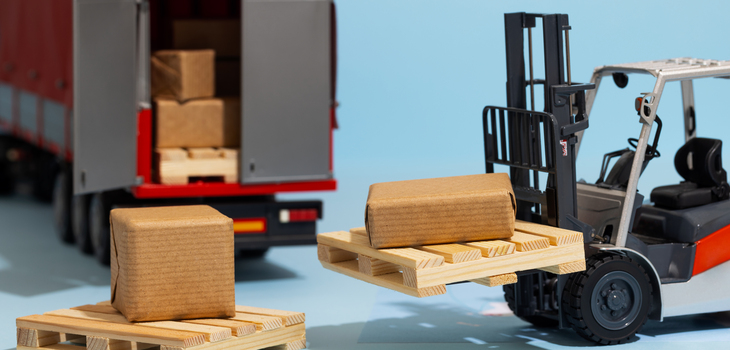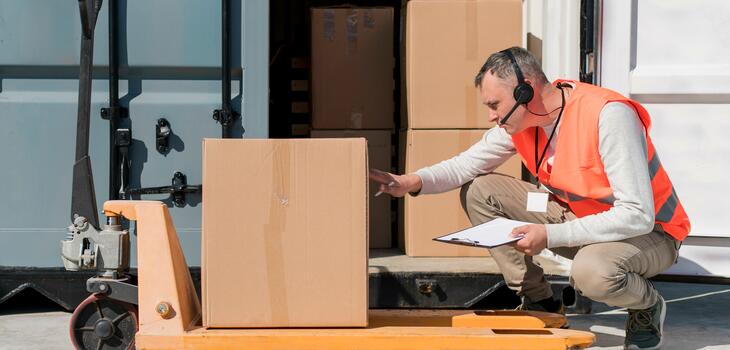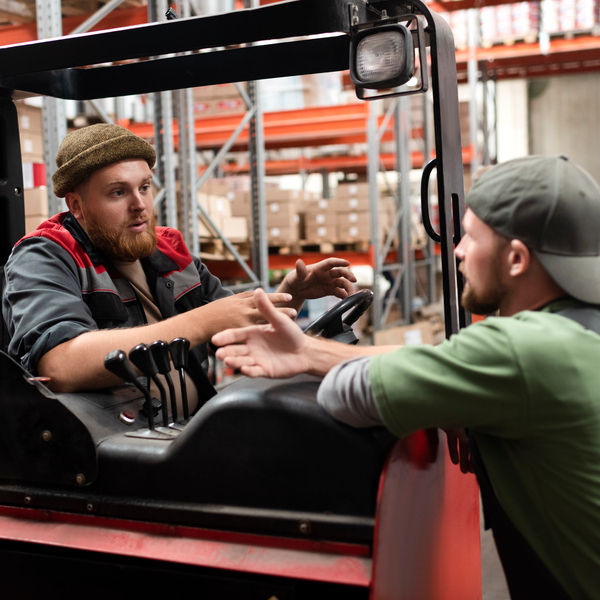8 Challenges in B2B Logistics and How Moovick Solves Them

Since the pandemic, b2b logistics has raised its use case, and firms are increasingly concerned about working out the best for maximum profit. When logistics is carried out effectively, a business can freely expand its success. In other cases where it poses hiccups, it can be tricky for the enterprise to thrive. Imagine a situation where logistics for B2B is a lucrative venture. Goods are delivered on time and in the same condition as they left. Customers are happy and satisfied, and firms are willing to have another successful transaction with you.
Some industries often organize B2B logistics, and this is no exception for wholesale and manufacturing. However, problems may vary depending on each company's market position and logistics execution strategy. Small and medium-sized businesses will have to compete for warehouses with larger companies. The disadvantages are size and superiority. SMEs must process deliveries quickly while facing similar challenges.
Understanding B2B logistics for SMEs
Business-to-business (B2B) logistics involves planning and executing the inflow and outflow of goods from one business to another, typically between suppliers and retailers. It revolves around production and delivery and covers things like transportation means, schedule, delivery windows, cost, packaging, storage choices, and more.
Since these shipments between businesses are typically larger, they can quickly manage inventory and warehouses. While business-to-customer (B2C) logistics commonly involves smaller and more frequent shipments, B2B logistics achieves more cost control.
In a wholesale marketplace, B2b third-party transport services have become popular. This refers to a commercial agreement with a third-party firm to manage their shipping, warehousing, order fulfillment, and other logistical needs. In-house logistics is when the business does it on its own without relying on third-party logistics (3PL). Large companies may have the time and money to employ drivers, warehouse workers, and logistics coordinators to purchase trucks and vehicles. It sounds like a lot of work, and better put it, challenges when small and medium-sized enterprises think about it.

8 Chalenges of Business transportation Logitics
Managing B2B logistics can be a genuine headache, keeping you awake and burning the midnight oil. Here are the common issues small and medium-sized enterprises face:
1. Time-consuming management: Logistics for B2B communication shortens quality production time. The emphasis shifts to minutes for manual coordination, phone calls, and negotiations. There are numerous moving components, and connecting them pulls down the core of the firm. Sorting, handling, coordinating with drivers, arranging pickups, and fixing transportation issues are a full-time job, and there is little time left to go over other sections of the organization that require improvement.
2. Transport providers are inconsistent: An unreliable logistics partner is like a leaking wall pipe, producing a massive mess in plumbing. Late deliveries and no-shows disrupt business. Delays from 3PL will increase the wait time. When transit is stalled for an extended period, deadlines are missed, and perishable commodities suffer harm. Customers may abandon you if delivery disruptions compromise their peak sales opportunities. Lost sales and a damaged reputation will follow if delivery issues aren't promptly addressed.
3. High courier costs: Charges for courier services are not certain. Pricing is based on order volume and distance, but it is not clear. Businesses still pay the same price, even if their shipment fails to meet expectations. They are subject to inflexible pricing regimes, and additional fees, such as fuel surcharges or handling fees, can quickly accumulate.
4. Rigid delivery schedules: Same-day delivery is nearly impossible. Because traditional courier services lack flexibility, businesses must adapt and meet them halfway. Logistics cannot meet the changing demands of the supply chain. Thus, it cannot accept tiny shifts or last-minute arrangements.
5. Lack of real-time tracking: Customers increasingly expect to know where their things are at all times, which is a significant deal. Transit reports from courier providers are frequently inaccurate, and firms are unable to plan production. No visibility into deliveries leads to uncertainty and missed opportunities. Mobile tracking necessitates the use of cutting-edge technologies, which enterprises do not have.
6. Complicated payment and invoicing: Manual processes take time and slow down operations. Entering data by hand can lead to errors. Invoices frequently have many line items. Modifying invoices, particularly line items, can be difficult. An invoice has numerous legal obligations, and laws complicate matters further.
7. Finding the correct vehicle type: Many platforms don't offer personalized transport options for businesses of all sizes. The vehicles available are substantially larger than required, resulting in paid-for unused spaces. Some products are temperature-sensitive and will only be transported in dedicated vehicles. Similarly, perishable commodities must be shipped in a manner that preserves them. Finding a car that fits and is within your budget takes time. Quality time is lost sorting through numerous possibilities, each with at least one defect that cannot be managed.
8. Labor requirements: Large enterprises that operate a logistics fleet must commit to a labour hunt. To keep things going properly, the sector will employ truck drivers, warehouse employees, and a logistics coordinator. A lack of reliable personnel can make the system useless. Employee retention is challenging owing to demanding work conditions, and resources are spent training individuals to ensure they are up to date on approved practices.

How Moovick solves B2B logistics for small and medium-sized businesses
We at Moovick understand why your company must make its products more available worldwide. As a result, we offer customized and on-demand business-to-business logistics to small and medium-sized businesses.
Who are we?
Our commitment is to assist you in expanding your business. We handle your logistics and communication with other players, allowing you to focus on your core business. We provide superior B2B transport service solutions, including:
- Instant booking and automation: A small firm must make its goods available rapidly and with instant delivery, which is what we offer. You can rapidly book on-demand logistics for a last-minute request and be confident that your organization will deliver on time. Handle everything using the Moovick app, with no calls or delays.
- Trusted transporters: Our movers are verified and provide expert B2B transportation services. We are a trusted shipping firm that delivers your things to their destination in excellent shape as they leave.
- Cost-effective and transparent pricing: You only pay for what you use; there are no commitments or surprises. Logistics should not be a barrier to your business's ability to thrive.
- On-demand and flexible: Need a vehicle right now? Get one right away, anytime you need it. Reduce wait time and get an urban pickup in less than 30 minutes. Use the services you need, including extra muscles for parallel tasks. Live tracking and comprehensive control: Know exactly where your vehicle is at all times. Our AI-powered b2b transport system lets you track stoppages, uploads, offloads, and arrivals down to the minute. By offering them a fixed delivery date, you can ensure their happiness and satisfaction.
- Seamless digital payments: No need to fill out bank checks or paperwork to pay bills. Businesses can use one-click invoicing and several payment choices.

- Storage Solution: Small businesses without vast facilities to store products can benefit from our flexible storage options. We provide both short-term and long-term solutions to help companies manage unpredictable demand. Moovick takes care of your storage needs, enabling you to focus on the rest of your business.
- Moovick has everything, from vehicles to trucks. Businesses connect with the conveyance that best fits their merchandise condition and maximise space.
In Closing
The logistics sector has changed from a focus on B2C to B2B transportation. Knowing the problems it entails prepares the mind for what lies ahead. It is also prudent to be prepared and positioned for inevitable setbacks throughout the early phases. A corporation that wishes to keep its customers satisfied must provide speed, efficiency, and professionalism. This stresses the need for a strong supply chain that delivers and logistics systems to meet customers' ever-increasing demands. Moovick is a one-stop solution for comprehensive business logistics, and we save the day, navigating the twists and turns of B2B logistics with ease! Contact us now!
Popular Articles

Planning Hotel Renovation: Why You Should Hire Handyman Services

Move to Switzerland: Your Ultimate Guide

5 Things You Never Knew You Could Use Crowdshipping For!

How Our Office Relocation Experts Can Save Your Business Time and M...

The Art of Seamless Furniture Logistics: How Moovick Ensures Smooth...

The Benefits of Professional Handyman Services For Office Funiture ...

